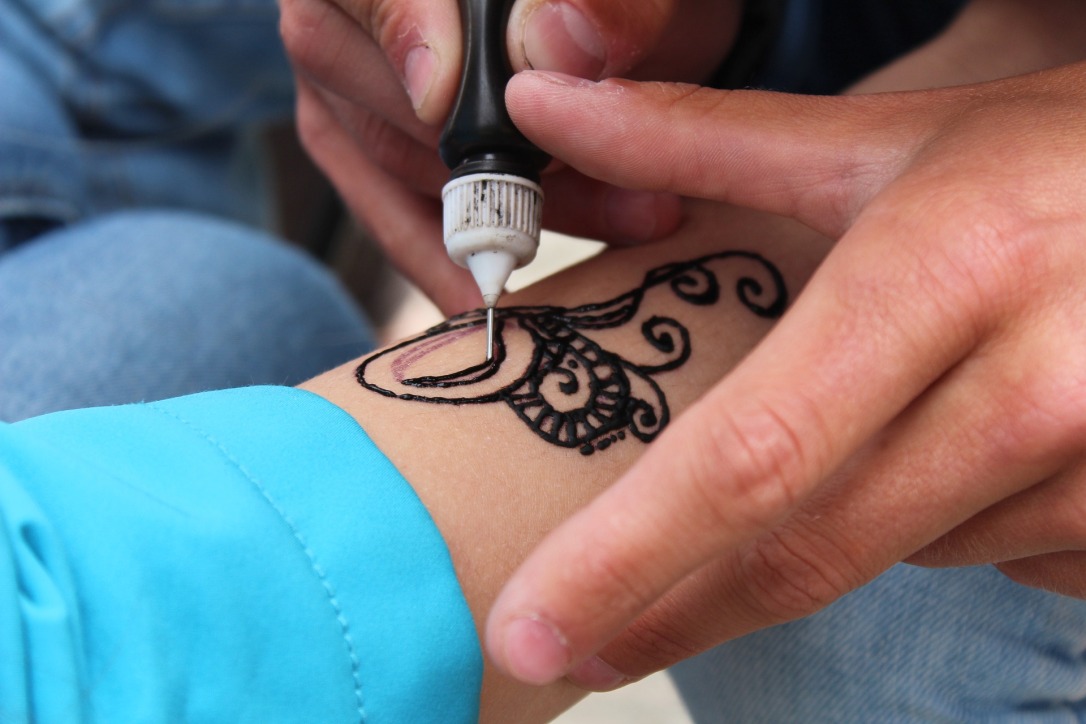 Natural henna dye is prepared from the plant Lawsonia inermis. It’s been used to dye skin, hair, nails as well as fabric since ancient times. On the contrary black henna is a misleading marketing name derived from mix of indigo plant and synthetic chemical dye such as p-Phenylenediamine (PPD). Black henna is popular for temporary tattoos and permanent hair colour.
Natural henna dye is prepared from the plant Lawsonia inermis. It’s been used to dye skin, hair, nails as well as fabric since ancient times. On the contrary black henna is a misleading marketing name derived from mix of indigo plant and synthetic chemical dye such as p-Phenylenediamine (PPD). Black henna is popular for temporary tattoos and permanent hair colour.
Natural henna leaf is difficult to stain on its own. The leaves are dried and finely powdered and made paste with water, lemon or strong tea. The paste is left for several hours to release lawson molecule. This henna paste when applied on skin or hair and left for few hours, leaves a reddish orange stain. This is a completely natural process to dye hair and skin, with a very low probability of any skin allergy or reaction.
Black henna may contain unlisted chemicals. Most commonly used chemical is p-Phenylenediamine (PPD) which gives a very quick black stain on skin and hair. PPD can cause severe allergic reaction and potentially sensitize skin. In USA, FDA specifically forbids PPD to be used for this purpose, and may prosecute those who produce black henna. Artists who injure clients with black henna in the U.S. may be sued for damages. In Europe, any product containing PPD must be labelled “For professional use only. This product can cause severe allergic reactions. Read and follow instructions. This product is not intended for use on persons under the age of 16. Temporary ‘black henna’ tattoos may increase the risk of allergy. Eyelashes shall not be coloured if the consumer: — has a rash on the face or sensitive, irritated and damaged scalp, — has experienced any reaction after colouring hair or eyelashes, — has experienced a reaction to a temporary ‘black henna’ tattoo in the past. Rinse eyes immediately if product comes into contact with them. Contains phenylenediamines. Wear suitable gloves.”
Recently, natural henna is becoming more commercially available as a safe alternative to chemical dye. LUSH Henna is one natural henna hair dye which can be used as a safe option over black henna or synthetic hair dye.
Temporary tattoos containing PPD is very popular during summer time or holidays. This is used by people of all age group resulting in severe lifelong allergic reaction. The British Skin Foundation has launched #AVOIDBLACKHENNA campaign as summer months approach.
Dr Flower says that everyone should be suspicious of black “tattoos”.”Real henna is never black, but is orange-brown,” he explains. “Any very dark temporary tattoo should be treated with caution.”
Lisa Bickerstaffe at the British Skin Foundation agrees. “Check the colour if a product is described as ‘henna’,” she says. “Henna is an orange-red colour, so if you are offered a temporary tattoo with ‘black henna’, it isn’t actually true henna. If in doubt, stay away.”
Both Flower and Bickerstaffe advise reading the list of ingredients. Avoid the product if it lists PPD or paraphenylenediamine. But even this is no guarantee of safety, as the ingredient list might not be accurate or comprehensive.
